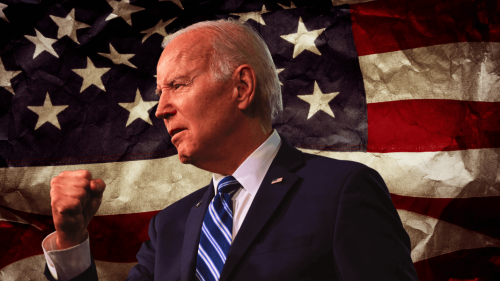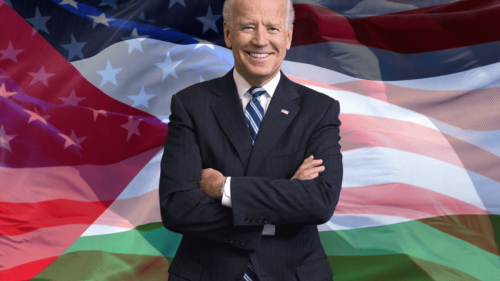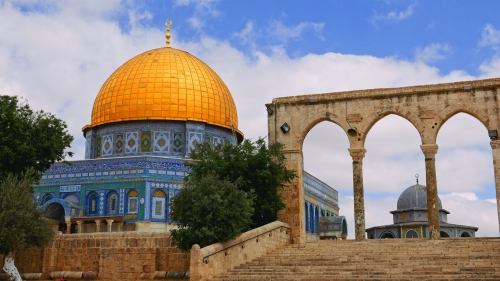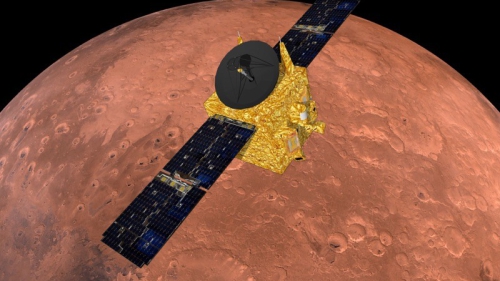Bush's 'Forward Strategy': Democracy and Paradox
 |
As a token of goodwill, we shall presuppose that President George W. Bush's ardent calls for democracy in the Arab world don't envisage politically motivated, court determined elections, like that of his. Nor, shall we assume that the President was fervently calling for a racial/religious democracy that is maintained through exclusiveness and customary acts of ethnic cleaning, so that the demographic composition of a state might be sustained, like in the case of Israel. But goodwill alone can hardly prepare one for the paradoxes that the president's democracy calls so starkly infuse.
In two separate speeches - one in Washington on Nov. 6, and the other in London, on Nov. 19- Bush made it his personal crusade to democratize the Arab world. There is "freedom deficit" among Arab states, he warned, which, "has terrible consequences for people in the Middle East and for the world." In London, he elaborated; "Now we're pursuing a different course, a forward strategy of freedom in the Middle East. We will constantly challenge the enemies of reform and confront the allies of terror."
Bush outwardly admonished the legacy of Western countries when he called out, "We cannot turn a blind eye to the oppression just because the oppression is not in our own backyard. No longer should we think tyranny is benign because it is temporarily convenient. Tyranny is never benign to its victims, and our great democracies should oppose tyranny wherever it is found."
The president's "forward strategy", however, despite its distinctive forcefulness, is at best, a misguided interpretation of the root causes of the ills of the Arab world - and equally the Muslim hemisphere - and at worst, another charade aimed at diverting attention from the morally bankrupt, financially unbearable, occupation of Iraq.
Failing to retrieve any of Iraq's alleged banned weapons and unable to justify the high death toll among American soldiers in 'liberated' Iraq, the warranted, albeit insincere call for a greater Middle East democracy was one out of very few diversion maneuvers still accessible to the administration. In a time where distraction was imperative; the Bush administration plainly denied the ailing US economy of $87.5 billion, by signing a supplemental spending bill to finance the botched war in Iraq, and less visibly, but incontrovertibly dreadful, the illusive war in Afghanistan.
Of course, this should not render irrelevant, nor nullify the calls for democracy and transformation in the Arab world. Despite cosmetic changes, most Arab states are indeed sinking deeper into political quagmire, repression and tyranny. Re-energized and validated by the US 'war on terror', some Arab regimes used 9/11 as an invitation for coercion, rather than self-examination. The newly sanctioned tools of fighting terrorism "gave authorities in some Arab countries another excuse to enact new laws limiting civil and political freedoms," explained a UN Human Development Report, released October 2003.
But the dispiriting reality in the Arab world seems only useful - from the Bush administration's point of view that is - as a further rationalization for military intervention, political and economic dominion, rather than a compelling incentive for genuine change through less chaotic means.
Considering how far-fetched such attempts are, to 'win' the Arab street, Bush's rhetoric is apparently articulated for American and European consumption. For the Arab peoples, whose aspirations are often distained by Arab regimes and their western benefactors, the Bush administration's scrutinizing dishonesty is all but concealed.
While many, outside the Arab world, might have been relieved to hear Bush's thoughtful avowal, last April, that the "form and leadership" of the anticipated Iraqi government "is for the Iraqi people to choose," Arab media cited almost simultaneously, a contrasting assertion made by Defense Secretary Donald Rumsfeld: Iraqis are free to choose their own government, as long as it's not an Iranian style; "that is not going to happen."
But the collective Arab memory, whose mistrust of Bush and his allies can hardly be redressed by a few speeches, however tedious, identify the anguish inflicted by their autocratic leaders as a fragment of a long, daunting quandary, orchestrated by old and neo-imperialists, in which the United States is the latest participant.
The US media spoke of Bush's yet new vision of a Middle East democracy as an unsurpassed revelation, while in truth, Bush remained committed to the same historical fallacies, embraced by past administrations or their intellectual circles. Making Damascus and Tehran, each a pivotal point of his argument only contributed to the fraudulency of the badly knitted "forward strategy" discourse; history remembers many events that Bush chose to conveniently forget, such as the CIA's direct role in toppling two promising democratic experiences, a parliamentary one in Syria in 1949 and the overthrow of the democratically elected Prime Minister of Iran, Mohammad Mossadegh, in 1953.
What some have purposely depicted as a revolutionary tone in Bush's latest 'vision', was in fact additional misrepresentation. "Sixty years of Western nations executing and accommodating the lack of freedom in the Middle East did nothing to make us safe because in the long run stability cannot be purchased at the expense of liberty," Bush said in his Washington Speech. Camouflaged with the president's contention was an intentional evasion from the historical truth that the 'Western nations' own self-serving schemes were largely to blame for the disfigured geopolitical recovery of the Middle East. Painfully honest British journalist Robert Fisk comments: "We created this place (the Middle East), drew its borders, weaned their grotesque dictators. And we expect the Arabs to trust Mr. Bush's promise?"
Consumed by alluding Americans into paying the high price of the political heedlessness of his administration, by playing the role of the liberator of the Arab people from their menacing rulers, whom the US helped create and sustain, Bush is hampering the chances of an authentic thrust toward a representative, institutionalized democracy in the Arab world. He is evoking reluctance rather than inspiring reform, underscoring the values of chaos, rather than the virtue of peaceful, yet resolute change. By vindicating the West and its imperialist schemes, hailing Israel and its perplexing democracy, and justifying his government's own lack of commitment toward peace and justice in the Middle East, Bush's call for democracy remains a smokescreen, whose ultimate intent is the perusal of the same detrimental, self-absolved neo-conservative doctrine, bent on domination using deceit and ever changing pretexts.
"Of course, (Arabs) want freedom," wrote Patrick Seale, a veteran Middle East analyst in the Lebanese Daily Star, responding to Bush's democracy cry, "but the main freedom they seek is freedom from the United States."
The paradox is overpowering.
Ramzy Baroud is a Palestinian-American journalist and editor-in-chief of The Palestine Chronicle online newspaper. His articles were published and quoted in newspapers around the world, including the Washington Post, the International Herald Tribune and the Guardian, among others. He is the editor of the anthology: "Searching Jenin: Eyewitness Accounts of the Israeli Invasion." Baroud is also a researcher for the Qatar-based al-Jazeera Net English.
To buy "Searching Jenin: Eyewitness Accounts of the Israeli Invasion" CLICK HERE
Related Suggestions
Go for it.
The U.S. need democracy first, not the Middle East or other istans...because the COWBOY was "...appointed by his brother's friends in the SUPREME COURT of FLORIDA; HE WAS NOT elected" - Fidel Castro. And I tend to agree vehemently w/ Sir Castro.
All these war, lies, and "ranchy' emotional propaganda are work of Zionist think-tank to creat greater ISREAL, NOT DEMOCRACY. The ranchboy does not have brainpower to swim out the tank. Now He is paying for his stupidity w/ 2 soliders/day. TOO SAD!!! The Iraqis are shoving the concept of "GREATER ISREAL" down his throat...
..No wonder he went to Iraq like a cow..ard and flew back like a member of Phylum monkeysorus. If HE did the right thing for Iraqis, WHY DIDN'T he say "Bring it on" in the street of Baghdad or greet the locals? b/c He fortunately knows the answer...an RPG's velocity is much > the velocity of his msorus's wing.
Pardon my coining of new English words!!!
God bless!
Wassalam,
Intekhab.
Salaam aleikum,
This is a very good article, but the author doesn't go far enough in explaining the duplicity and history of hypocracy of the U.S. in this region. Secondly, we as Muslims cannot fall into the trap of embracing the habits and beliefs of our colonializers, what the U.S. does in the region, could not happen without the solid support and obediance the dictatorships and govts. in the region give (as well as the fools and sycophants of these govts. who live off of them give in turn). In sum, the blame is equal, and this author should also write critically about those Muslim "sheikhs" and "leaders" who serve as agents of these govts. and help perpetuate this cycle of colonization by embracing the colonizer...
salaam aleikum,
skh
One finds the people that make the laws may be well versed in one field of study if any and so when it comes to making laws they typically are ignorant in the field of study the law pertains to. While this might not sound good, the reality is typically much worse. Many politicians are attracted to office because they are attracted to power and have an agenda. Consider the ability of Bush to judge the Kyoto treaty or other environmental policy for example. But one person with no schooling in the environment, life sciences, climatology or any other related field was able to buck the considered opinions of those schooled in these fields to keep the worlds most polluting nation out of Kyoto.
While representative government may have been a good idea in the 1700's, now it is a threat to the survival of the human species. Humanity needs a new type of governing through mutual consultation. One that brings the opinions of the experts in a field into the position of setting the regulations for things within that field. The best examples of this being the National Electric Code and the Uniform Manual of Traffic Control Devices. Hopefully, such a system would not have the ignorant with an agenda governing the knowledgeable against their will.
The problem as I see are those problems that cross several fields or cultures. This is where governing yourselves through mutual consultation is most needed and most difficu

















